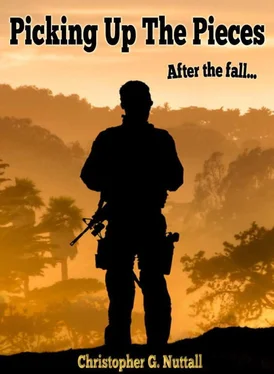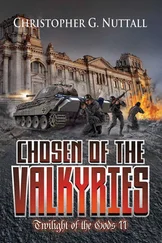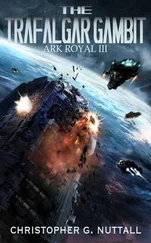I paused. The second suggestion was the kicker. “I would also suggest that you insisted that everyone who went on welfare take a contraceptive injection,” I added. Her eyes went wide. “The price for going on welfare should be to refuse to have any more children as long as they’re a drain on the public purse. I know it sounds horrible, but you don’t have any other choice. An increasing number of children in the cities will only be a drain on your resources. You need to move them out to the countryside…”
She didn’t want to hear it, or the rest of the suggestions, but I pushed her as hard as I could and finally she agreed to a trial session. That suited me just fine. We’d make it work and then adapt the scheme to the entire planet. And if that didn’t end the war…
There was always the doomsday option.
The existence of an insurgency of any kind marks the presence of a serious problem. It is vitally important to address that problem or the insurgency will never go away. Leaders and soldiers come and go, but the insurgency is endless.
–
Army Manual , Heinlein
We started the following week.
I hadn’t expected it to be easy to round up the first prospective farmers — and it wasn’t — but there were hundreds of thousands of possible candidates. For the first few hundred, we concentrated on men who had families and something to work towards apart from their self-gratification, or their self-destruction, as seemed to be the case with most of the drug addicts. We couldn’t eat many of the native crops of Svergie, but one particular weed could be used as a drug, giving a short burst of near-orgasmic pleasure, followed by a long period of depression. The drug addicts never seemed to be short of supplies; the weed was so common that the planet didn’t really have a drug mafia like several other worlds.
We’d chosen, upon the advice of the Legionnaires who had some farming experience, a patch of land several thousand miles from New Copenhagen. I’d had several motives for agreeing to that location; not only would it be hard for the enemy to mount an attack on the new farms, but it was also be hard for the new farmers to leave the land and return to the city. I didn’t want to have to force them to work — and I expected that most of the volunteers, for they had been volunteers, would stick it out — but I didn’t want to make leaving easy. A handful of boats could transport the crop from the farms to the cities; in time, we’d build a road and a railroad. The important thing was that we wouldn’t be trespassing on the land owned by already-established farmers.
The first task had been to break the ground and here the Communist prisoners came in handy. I’d made them all an offer when we’d shipped them from the detention camps to the new farms; if they worked for five years assisting us with setting up new farms, they could have their own farms afterwards. I meant it too; after five years, they’d have skills we needed and they’d hopefully have picked up the working attitude. The drug addicts or hardcore Communists would weed themselves out before they were released. We put them to work breaking the ground and weeding out the native plants, while I went back to the other detention camp. I had people I wanted to recruit.
“I don’t see any point,” I told the imprisoned farmers, “in beating around the bush. You know why the war started as well as I do. I intend to fix the problem by transporting as much of the urban population out of the cities and into the countryside — into new farms — as quickly as possible. This isn’t going to be easy. Very few of them have the slightest idea how to grow small crops, let alone massive farms. We need your help.”
It was true. Back during the early days of New Copenhagen, there had been a set of allotments for urban residents who had wanted to grow their own food, or at least small amounts of fruit and vegetables. The UN had tried to limit or ban the practice, regarding it as elitist — there was more demand than there were allotments — but enough had survived the UN’s semi-legal attempts to get rid of them that we had a core of people who had a vague idea of what they were doing. The problem lay in scaling up what they knew to a full-sized farm… and that wasn’t going to be easy. We weren’t helped by the fact that our supplies of farm machinery were critically low and we needed to use hands and non-powered tools where we would have preferred powered equipment. There were skill sets that were never used these days, apart from the pastoral worlds, and we would have to reinvent them under pressure.
“You were all arrested in acts of aggression against the government,” I continued. I held up a hand to stem the political argument I knew was coming. The farmers were lucky to be alive. As the embargo continued to grip the civilian population, the soldiers had been growing nastier, aware of what was happening to their civilian relatives. “If you give us one year of your time to help make the farms grow, we will release you without further detention.”
There was a brief murmured discussion among the farmers, and then a leader was pushed forward. “We’ve seen attempts by the cities to push their surplus population out into the fields before,” one of the farmers said, finally. “Why should we assume that this will work any better than the last attempt?”
I studied the farmer thoughtfully. He looked to be pure Scandinavian blood, rather than the more mixed racial heritage of the cities, but I wouldn’t hold that against him. The racial aspect of the conflict had been kept on the back burner as much as possible — and yes, there were farmers who were far more mixed than their spokesman. In the long run, the entire situation might sort itself out, if Svergie didn’t tear itself apart first.
“We won’t let it fail,” I explained. “We’ll be establishing the new farms well away from your farms and giving them as much help as we can.” I threw in my sweetener. “If we can get the new farms established, the Acting President has agreed to repeal the legislation you find so offensive and end the war on favourable terms. The planet needs fed and this is the best way we can find to do it.”
In the end, seventy-one farmers agreed to work for us in the new farms, although they drove a harder bargain than I had expected. They insisted on having armed soldiers stationed at the new farms to protect them from their workers, rather than their former comrades, and some — mainly younger children of farmers who wouldn’t inherit — demanded farms of their own. I agreed at once; I’d already intended to have soldiers on guard — previous experiments had been wrecked by teenage urban residents stealing, raping and murdering — and giving them farms of their own would only provide encouragement to work to make it a success. A handful refused to join us and had to be returned to the detention camps. I couldn’t release them. Not yet.
Two weeks passed slowly. Fort Galloway, under Ed’s command, reported a series of skirmishing raids and a handful of snipers taking pot-shots at anyone who showed their face, but other than that little happened. My soldiers — the Legion and the Svergie Army — patrolled through the nearby farms, but left the mountains and the miners strictly alone. I didn’t want to risk men patrolling in an area that would take thousands of additional soldiers to take and secure. I wasn’t fooled by the quiet either. Quiet, in my experience, meant that the enemy was preparing something pretty damn devastating.
“There’s been nothing, apart from the shots,” Ed reported, when I checked in with him one night. “A couple of soldiers have the galloping shits” — tummy upsets caused by eating too many MRE packs — “and another nearly managed to hurt himself on the shooting range, but apart from that it’s been quiet.”
Читать дальше












